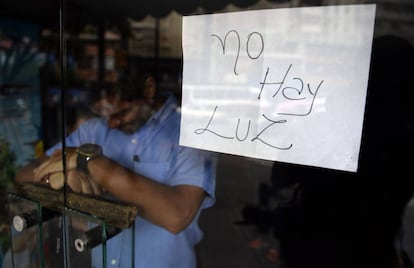Venezuela changes time zone as energy crisis worsens
Move by President Maduro comes after introduction of four-day working week for government employees


Venezuelan President Nicolás Maduro has announced his country is once again changing its time zone, as a severe drought reduces power output by lowering water levels at hydroelectric dams. No details have been given as to whether Venezuela’s clocks will move forward or backward, only that the change will be introduced on May 1.
“We have to adapt at a time of revolution so that [climate] change affects the quality of life and happiness of our people as little as possible,” the president said on Thursday.
Earlier this month, Maduro ordered a four-day working week until the end of May for government employees as part of continued energy-saving measures that saw extended Easter week holidays. On Friday, an extended, five-day national holiday to “reinforce” energy savings begins.
Former President Hugo Chávez put Venezuela four-and-a-half hours behind GMT in 2007, saying this would allow children to prepare for school during daylight
Non-government sources reported more than 8,250 power cuts between January and March, while experts predict that the country’s power stations are on the verge of collapse.
In February, Venezuela, one of the biggest oil-producing nations in the world with nearly 300 billion barrels of proven reserves, began importing crude oil to help its staggering economy.
Business leaders have questioned the efficacy of reducing working hours to save energy, saying this simply worsens the country’s long-standing economic crisis. The government blames the electricity shortages on drought caused by the El Niño weather phenomenon, while the opposition has accused President Maduro’s administration of mismanaging the national grid.
Almost 70 percent of the South American country’s electricity comes from hydro power, and officials have been warning for weeks that the water level behind the nation’s largest dam has fallen to near its minimum operating level. If the government had to shut down the dam, electricity supply would be crippled.
Former President Hugo Chávez put Venezuela four-and-a-half hours behind Greenwich Mean Time in 2007, saying this would allow children to sleep later and prepare for school during daylight. Venezuela is near the equator so daylight varies little by season.
Sign up for our newsletter!
EL PAÍS English Edition is launching a weekly newsletter. Sign up today to receive a selection of our best stories in your inbox every Saturday morning. For full details about how to subscribe, click here.
English version by Nick Lyne
Tu suscripción se está usando en otro dispositivo
¿Quieres añadir otro usuario a tu suscripción?
Si continúas leyendo en este dispositivo, no se podrá leer en el otro.
FlechaTu suscripción se está usando en otro dispositivo y solo puedes acceder a EL PAÍS desde un dispositivo a la vez.
Si quieres compartir tu cuenta, cambia tu suscripción a la modalidad Premium, así podrás añadir otro usuario. Cada uno accederá con su propia cuenta de email, lo que os permitirá personalizar vuestra experiencia en EL PAÍS.
¿Tienes una suscripción de empresa? Accede aquí para contratar más cuentas.
En el caso de no saber quién está usando tu cuenta, te recomendamos cambiar tu contraseña aquí.
Si decides continuar compartiendo tu cuenta, este mensaje se mostrará en tu dispositivo y en el de la otra persona que está usando tu cuenta de forma indefinida, afectando a tu experiencia de lectura. Puedes consultar aquí los términos y condiciones de la suscripción digital.








































